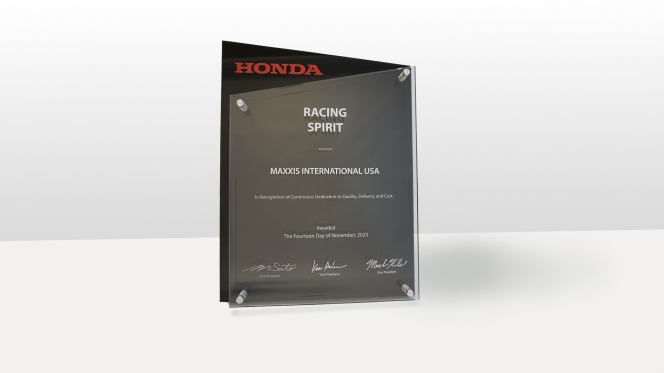
The Yokohama Rubber has developed a proprietary system that utilises AI to predict the physical properties of rubber compounds. The system is already being used to design rubber compounds for Yokohama tyres. The company is expecting the system’s ability to conduct a large number of virtual experiments will enable it to accelerate compound development, reduce development costs, and develop better performing products. The system also will make it easier for less-experienced engineers to create new compounds.
The system was developed under Yokohama’s new AI utilisation concept, HAICoLab, which was launched in October 2020. The system uses AI to predict a rubber compound’s physical properties based on the rubber compound design parameters input by an engineer. In addition, to facilitate engineers’ ability to confirm predicted results, the system includes a function that displays the certainty of predicted physical properties and one that searches for a compound composition that will achieve physical properties closest to the targeted ones. The new system enables collaborations between humans and AI that will lead to the acquisition of new knowledge. Going forward, Yokohama Rubber will expand the use of this new system for developing rubber compounds for use in tyres to a wide range of the company’s other products, including hoses and conveyor belts.
HAICoLab is an acronym for “Humans and AI ColLaborate” for digital innovation. It also has the meaning of a laboratory for joint research by humans and AI. The new concept aims at fostering digital innovations by facilitating collaborative efforts that merge human inspiration and creativity with the enormous data processing capability of AI. Yokohama aims to acquire new knowledge by creating and collecting data based on hypothetical conditions set by humans and then applying AI to predict, analyze and then search for the most optimal result. Yokohama Rubber has been advancing technological developments by using AI in its material and tire design and development processes. For example, in 2017 Yokohama Rubber unveiled a new rubber material development technology that applies materials informatics and a tyre design technology that applies informatics technology. Under its new HAICoLab concept, Yokohama Rubber is now using AI to develop innovative products and services as well as processes. Through this effort, Yokohama Rubber will contribute to the realisation of “Society 5.0,” a future society that will enhance people’s experiences and take advantage of innovative technologies such as AI and IoT, as advocated by the Japanese government’s Cabinet Office.
Wider range of AI utilisation
Tyre Trends spoke with Dr Eng. Masataka Koishi, Executive Fellow, Head of AI Laboratory, The Yokohama Rubber Co.,Ltd, for more details on the new development.
What led to the development of HAICoLab concept? Will this be extended to other areas of R&D?
We have been pursuing a number of AI initiatives, but they are limited to certain areas. Moving forward, our desire to use AI in a wide range of fields led us to create HAICoLab as a framework to support more widespread use of AI in the future.

In addition to serving as the foundation of our future future efforts, I think it will also help communicate Yokohama Rubber’s stance on AI utilisation.
We believe that people will play the key role in achieving digital innovation, which will be achieved by applying AI to real and virtual data that is based on hypothesis setting that is derived from human inspiration and eliminates cognitive bias. This collaboration between humans and AI is what we are calling HAICoLab.
Prior to formulating HAICoLab, we were proceeding with technological developments using AI in our material and tyre design and development processes. In 2017 we announced a rubber material development technology that applies materials informatics and a tyre design technology that uses informatics technology. We are now working on the structures, materials, and production areas that will lead to innovative processes (design development) and products.
Developments in other areas are not yet at a stage where we can make any concrete public announcements.
Please comment on the R&D team. Is Yokohama working in association with any University, Research Institute etc?
We are applying the results of research conducted with universities and research institutes in Japan and overseas in our development of materials informatics and tyre design technology using informatics as well as to HAICoLab. Meanwhile, our effort to generate virtual data through simulations and analyse that data using machine learning is being carried out on supercomputers available through Japan’s High Performance Computing Infrastructure (HPCI) as well as our own supercomputers.
How is Yokohama proceeding to adopt AI in other areas of tyre development?
Similar to our effort with compounds, we are now making preparations for the use of AI when considering tyre design specifications. However, we are not yet at the stage where we can say anything more specific.
While developing new concepts, is Yokohama focusing on new innovations in the automotive sector? Kindly comment in detail
We believe that the tyres of the future will need to respond to the trends towards the application of CASE and IoT technologies in automobiles. Accordingly, we are developing new technologies that will accommodate CASE. For example, as previously announced at a press conference at the 46th Tokyo Motor Show held in 2019, in the CASE domain of connectivity we are conducting joint research and development with Alps Alpine with a view to creating a solution business that will supplement our existing tire air pressure detection sensor with the ability to detect tread wear and road-surface conditions and then use digital tools to process and manage the acquired data.
In addition, this February we announced our SensorTire Technology Vision, a medium- and long-term vision for developing new technologies for passenger car tyre sensors. By implementing this Vision, we aim to support people’s mobility and contribute to the safe and secure operation of motor vehicles while addressing the changes in mobility demand by providing data obtained from SensorTires (IoT tyres) fitted with sensing functions to drivers and businesses providing various automobile-related services.
Looking further into the future, we plan to connect this data collected by our SensorTires with map data and road traffic related information (traffic jams, weather conditions, etc.) to provide value-added information, such as proposals for safe driving routes, that will contribute to the safe operation of autonomous-drive vehicles as well as the operations of companies engaged in MaaS-related businesses. By anticipating the various changed being brought about by electrification of the automobile and quickly and appropriately expanding our product lineup, we hope to secure a dominant position in the evolving tire market. (TT)
Maxxis Receives 2025 Racing Spirit Award From Honda
- By TT News
- March 04, 2026

American Honda Motor Company has honoured Maxxis with its 2025 Racing Spirit Award, recognising the tyre manufacturer's exceptional performance as a supplier. This accolade acknowledges Maxxis’ consistent ability to meet Honda’s stringent requirements regarding product quality, punctual delivery and cost efficiency.
The two companies have maintained a strong partnership since 2005, when Maxxis first began supplying original equipment tyres for Honda’s powersports division. Today, Maxxis tyres are fitted to popular Honda models such as the FourTrax Foreman Rubicon 4x4 and the Pioneer SxS. Expressing his gratitude, Andy Lee, President of Maxxis International – USA, conveyed that the entire organisation feels deeply honoured by the recognition. He attributed the achievement to the dedicated efforts of Maxxis employees, whose daily commitment ensures excellent products and service for their long-standing partner. Lee also reaffirmed the company’s dedication to upholding Honda’s expectations in the years ahead.
Lee said, “I know I speak for everyone at Maxxis when I say that we are truly honoured and delighted to receive this award. I’m also proud of the Maxxis employees who work hard every day to deliver excellent equipment and service to our OE partner of more than 20 years. We thank Honda and look forward to continuing to meet their expectations in 2026 and beyond.”
Michelin Introduces XHA3 Earthmover Tyre At ConExpo 2026
- By TT News
- March 04, 2026

Michelin North America, Inc. has launched the Michelin XHA3 tyre at ConExpo 2026. The product is the next generation in the company’s loader and grader range, succeeding the XHA2 model.
The XHA3 replaces several previous lines, including the XHA2, XADN+, XAD65 and XLD. According to the company, this launch represents its most significant innovation in the earthmoving segment in over a decade.
The new tyre has been engineered to meet the requirements of modern construction machinery, which now operate with higher loads and longer duty cycles. The XHA3 features increased load capacity and improved tonne-kilometre-per-hour (TKPH) performance compared to its predecessor.
It is built to carry heavier loads for modern earthmoving equipment. A new tread pattern engineered for durability and traction in loader and grader applications. It is designed to increase TKPH performance and extend tyre life. Aimed at reducing the total cost of ownership for fleet operators.
Yahn Heurlin, VP of Marketing, Michelin North America, said, “With the Michelin XHA3 tire, we’re building on a heritage our customers trust while delivering the next level of performance they demand. Construction equipment continues to evolve with higher loads, longer duty cycles and greater productivity expectations. The XHA3 tire, is designed to help fleets unlock more ton-per-hour performance, carry heavier loads with confidence and extend tire life, all while reducing total cost of ownership.”
Michelin Becomes Official Partner Of Rocket League Championship Series 2026
- By TT News
- March 03, 2026

Michelin has announced a strategic collaboration with BLAST, the organiser behind the 2026 Rocket League Championship Series (RLCS), which serves as the premier global tournament for the popular video game Rocket League. Through this agreement, Michelin becomes an official partner of one of the most energetic and widely viewed eSports properties on the international stage.
Rocket League itself enjoys immense global popularity, attracting several million active participants on a monthly basis. The RLCS season consistently draws tens of millions of views across the world, underscoring its significant reach. This move allows Michelin to deepen its involvement in the competitive gaming sector by associating with a high-profile series known for its passionate following.
The game’s core dynamic involves vehicles competing in a fast-paced arena where precision, control and rapid execution are paramount. These very attributes closely align with Michelin’s established heritage in mobility solutions and high-performance engineering, particularly its extensive background in motorsport. The partnership therefore represents a natural extension of the brand’s core principles into a digital environment.
By entering the world of the RLCS, Michelin seeks to enhance its connection with younger demographics and solidify its relevance within the digital spaces that are increasingly defining future trends and cultural habits. This initiative builds on a foundation of over 25 years during which Michelin has cultivated partnerships within the gaming and automotive simulation spheres, consistently applying its technological know-how to support both realism and superior performance in virtual driving experiences.
- Yokohama Rubber
- Yokohama ADVAN Tyres
- Nürburgring 24-Hour Race
- Nürburgring Langstrecken-Serie
- BMW M Motorsport
Yokohama Becomes BMW M Motorsport’s Official Tyre Partner For 2026 Nürburgring Events
- By TT News
- March 03, 2026

The Yokohama Rubber Co., Ltd., has entered into a new agreement to serve as the official tyre supplier for BMW M Motorsport, the division responsible for the brand's global racing endeavours. This collaboration will debut at the prestigious Nürburgring 24-Hour Race and throughout the Nürburgring Langstrecken-Serie in 2026.
This renewed partnership revives a historical connection between the two companies, who previously worked together on the same iconic circuit from 1980 to 1990. During that initial decade-long stint, their combined efforts secured two overall victories. After an interval of nearly four decades, they are reuniting for the current season to compete in the premier SP9 class, fielding the BMW M4 GT3 EVO. For this campaign, Yokohama will equip the vehicle with its high-performance ADVAN racing tyres, with the shared objective of capturing another overall win.

Beyond its tie-up with the BMW team, Yokohama Rubber continues its longstanding commitment to the Nürburgring. It will provide its tyres to numerous leading teams contesting both the endurance series and the 24-hour event this season. The company is focused on achieving an overall championship victory for a vehicle equipped with its YOKOHAMA brand tyres.
Franciscus Van Meel, CEO, BMW M GmbH, said, “We are excited to welcome YOKOHAMA as Official Partner of BMW M Motorsport for our Nürburgring programme. YOKOHAMA’s technical expertise and motorsport passion strengthen our drive for maximum performance and precision. Their support allows our team to focus fully on what defines BMW M Motorsport: pushing the limits on every lap. We look forward to a strong endurance season.”
Team: Schubert Motorsport
Class: SP9
Car: BMW M4 GT3 EVO
Tyres:
ADVAN A005 (for dry conditions); Sizes: front 300/680R18, rear 330/710R18
ADVAN A006 (for wet conditions); Sizes: front 300/680R18, rear 320/710R18
Race Schedule (as of date of this release)
March 14 (Sat): NLS Round 1
March 21 (Sat): NLS Round 2
April 11 (Sat): NLS Round 3
April 18 (Sat) –19 (Sun): Nürburgring 24-Hour Race (Qualifiers) , NLS Rounds 4 & 5
May 14 (Thu) –17 (Sun): Nürburgring 24-Hour Race
June 20 (Sat): NLS Round 6
August 1 (Sat): NLS Round 7
September 12 (Sat) –13 (Sun): NLS Rounds 8 & 9
October 10 (Sat): NLS Round 10







Comments (0)
ADD COMMENT